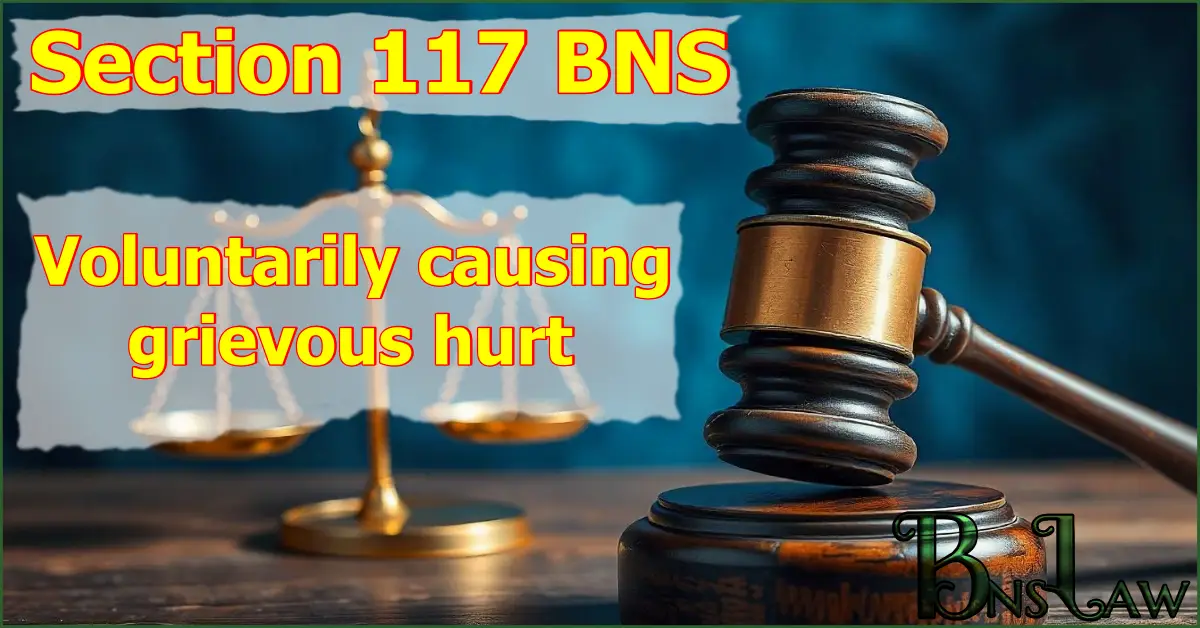Section 117 BNS | BNS 117
117(1) BNS
Whoever voluntarily causes hurt, if the hurt which he intends to cause or knows himself to be likely to cause is grievous hurt, and if the hurt which he causes is grievous hurt, is said “voluntarily to cause grievous hurt”.
Explanation— A person is not said voluntarily to cause grievous hurt except when he both causes grievous hurt and intends or knows himself to be likely to cause grievous hurt. But he is said voluntarily to cause grievous hurt, if intending or knowing himself to be likely to cause grievous hurt of one kind, he actually causes grievous hurt of another kind.
Illustration
A, intending of knowing himself to be likely permanently to disfigure Z’s face, gives Z a blow which does not permanently disfigure Z’s face, but which causes Z to suffer severe bodily pain for the space of fifteen days. A has voluntarily caused grievous hurt.
117(2) BNS
Whoever, except in the case provided for by sub-section (2) of section 122, voluntarily causes grievous hurt, shall be punished with imprisonment of either description for a term which may extend to seven years, and shall also be liable to fine.
117(3) BNS
Whoever commits an offence under sub-section (1) and in the course of such commission causes any hurt to a person which causes that person to be in permanent disability or in persistent vegetative state, shall be punished with rigorous imprisonment for a term which shall not be less than ten years but which may extend to imprisonment for life, which shall mean imprisonment for the remainder of that person’s natural life.
117(4) BNS
When a group of five or more persons acting in concert, causes grievous hurt to a person on the ground of his race, caste or community, sex, place of birth, language, personal belief or any other similar ground, each member of such group shall be guilty of the offence of causing grievous hurt, and shall be punished with imprisonment of either description for a term which may extend to seven years, and shall also be liable to fine.
READ OTHER SECTIONS OF CHAPTER VI — OF OFFENCES AFFECTING THE HUMAN BODY
FAQs of BNS Section 117
-
117 BNS punishment and fine
Punishment and fine under Section 117 of the BNS—
117(2): Imprisonment for 7 years and fine.
117(3): Rigorous imprisonment for not less than 10 years but which may extend to imprisonment for life which shall mean the remainder of that person’s natural
117(4): life Imprisonment for 7 years and fine. -
117 BNS cognizable or not
The offence under Section 117(2), 117(3) and 117(4) of the BNS is cognizable.
-
117 BNS bailable or not
The offence under Section 117(2) of the BNS is non-bailable and the offence under Section 117(3) and 117(4) is bailable.
-
117 BNS trial court
Offence specified in Section 117(2) of the BNS is triable by ‘Any magistrate’ while the offence specified in Section 117(3) and 117(4) is triable by the Court of Session.
Important Points
- Cognizable Offences: These are offences where a police officer can arrest a person without a warrant.
- Non-Cognizable Offences: These are offences where a police officer cannot arrest a person without a warrant.
- Bailable Offences: These are offences where the accused can get bail from the police station itself. All bailable offences are listed in the First Schedule of the Bharatiya Nagarik Suraksha Sanhita (BNSS).
- Non-Bailable Offences: Offences in which bail is not granted directly from the police station but after hearing the case in the court, the judge decides when bail will be granted. All non-bailable offences are listed in the first schedule of the Bharatiya Nagarik Suraksha Sanhita (BNSS).
- In the above FAQ, “trial court” means the court that has jurisdiction to try the offence.
- In the above FAQ, the expression “Magistrate of the first class” and “Any Magistrate” does not include Executive Magistrates.
Read other Sections of the BNS
Reference Link: New Criminal Laws (BNS), Ministry of Home Affairs







